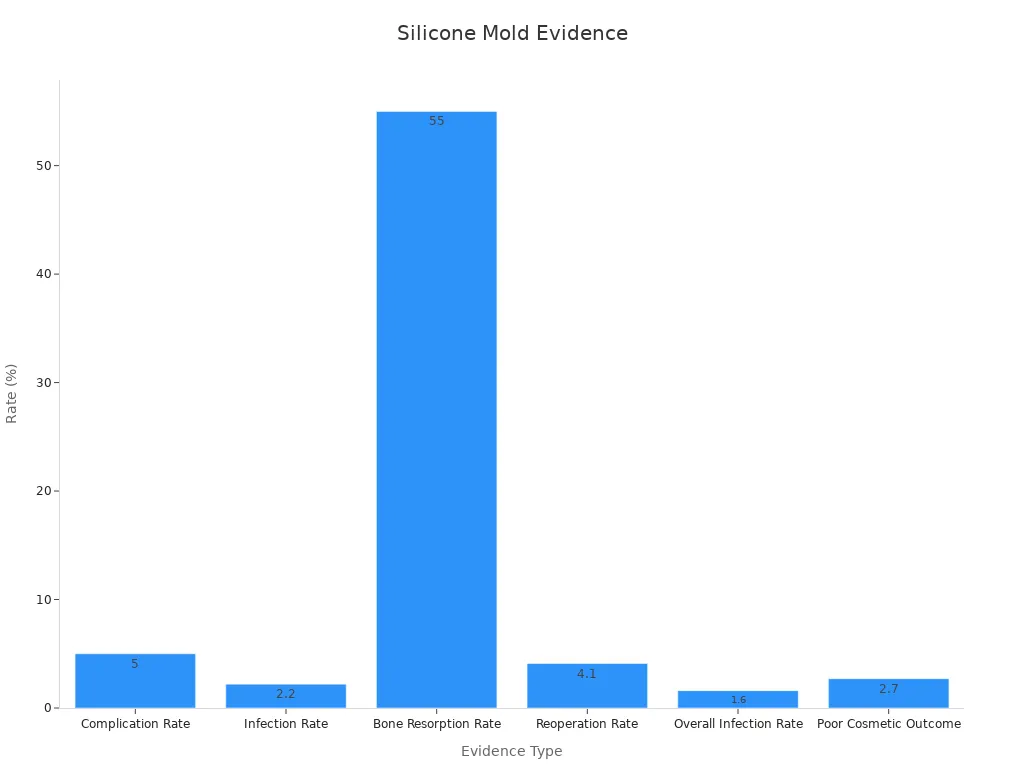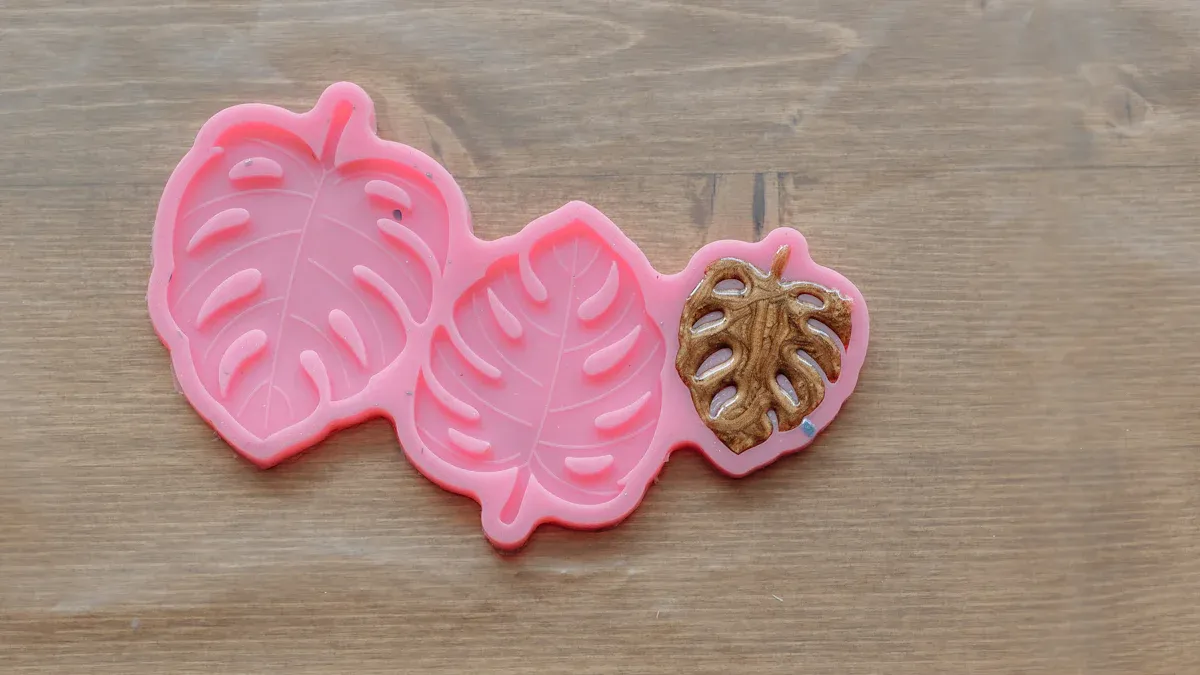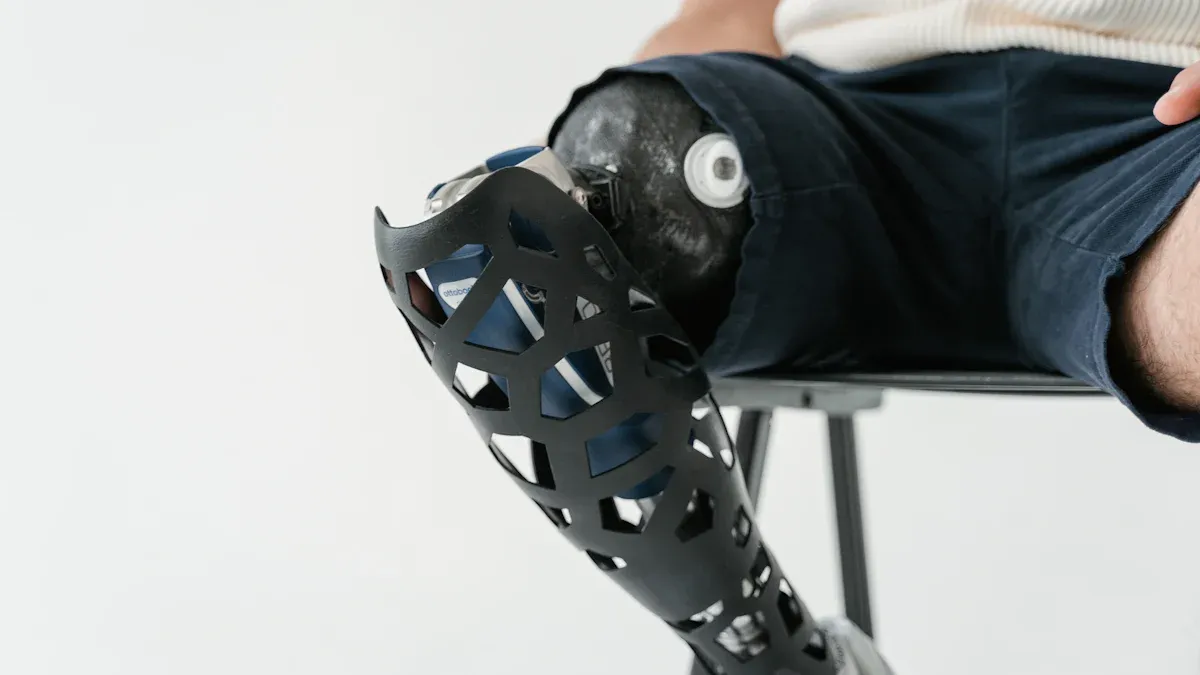
Custom silicone molds have become a cornerstone of modern medical manufacturing. You rely on them to create precise and safe medical-grade rubber products that meet the highest standards. Their unique adaptability allows manufacturers to design molds tailored to specific medical applications. This ensures that every product, from surgical instruments to prosthetics, fits its purpose perfectly. Moreover, their biocompatibility makes them ideal for use in devices that come into direct contact with the human body. By embracing these molds, you contribute to advancements in medical technology and improve patient care.
Silicone plays a pivotal role in the production of medical-grade rubber products due to its unique properties. Its biocompatibility ensures that it can safely interact with human tissues, making it ideal for applications such as implants, catheters, and prosthetics. Additionally, silicone elastomers dominate the market, holding over 50% of the share, as they are widely used in medical devices. This dominance stems from their superior thermal stability, chemical resistance, and flexibility, which are essential for creating reliable and durable medical products.
The growing demand for biocompatible materials has driven the rapid expansion of the medical-grade silicone market. For instance:
- The prosthetics application segment accounted for 37.0% of the market share in 2024, highlighting the importance of silicone in advanced prosthetic devices.
- Silicone elastomers held the largest revenue share of 48.0% in 2024, attributed to their ability to withstand sterilization processes and maintain integrity under extreme conditions.
By using silicone in medical manufacturing, you ensure that the products meet the highest standards of safety and performance, which is critical for patient care.
Custom silicone molds possess several key properties that make them indispensable in precision medical manufacturing. These properties ensure that the molds can meet the stringent requirements of the healthcare industry:
| Property | Description |
|---|---|
| Thermal Stability | Suitable for sterilization processes like autoclaving, ensuring safety and effectiveness after cleaning. |
| Chemical Inertness | Resistant to chemical reactions, maintaining the integrity of medical procedures and equipment. |
| Hydrophobic Properties | Repels water, reducing bacterial growth and contamination, crucial for sterile environments. |
| Transparency | Allows visual monitoring in applications like fluid transfer tubing, ensuring accurate observation. |
| Long Lifespan | Highly resistant to wear, UV light, and degradation, reducing replacement frequency and costs. |
| Customizable Properties | Enables tailored designs for specific medical needs, enhancing device effectiveness and comfort. |
| Consistent Results | Ensures reliable performance across various applications, critical for precision manufacturing. |
These properties make custom silicone molds highly versatile and reliable. For example, their thermal stability allows them to endure repeated sterilization cycles without compromising their structure. Their hydrophobic nature minimizes the risk of bacterial contamination, which is crucial in maintaining sterile environments. By leveraging these properties, you can produce medical devices that are both safe and effective.
Compliance with medical safety standards is non-negotiable in the healthcare industry. Custom silicone molds help you meet these stringent requirements by adhering to regulations and undergoing rigorous testing. For instance:
| Compliance Aspect | Description |
|---|---|
| FDA Regulations | Enforces strict regulations for silicone rubber products in medical applications. |
| Toxicity Standards | Manufacturers must ensure silicone compounds do not contain harmful substances. |
| Biocompatibility Testing | Essential for medical use, assessing safety through tests like cytotoxicity and sensitization. |
| FDA 21 CFR 177.2600 | Outlines requirements for elastomeric materials in contact with food, ensuring no toxic substances are present. |
| Quality System Regulation | Manufacturers must adhere to 21 CFR 820 to ensure safety and effectiveness of medical devices. |
A documented case study highlights the importance of compliance. A novel cranioplasty method used a 3D-printed silicone mold to create implants tailored to individual patient anatomy. This approach not only ensured a precise fit but also adhered to FDA regulations, demonstrating the reliability of custom silicone molds in surgical applications.
By ensuring compliance, you can guarantee that your medical products are safe, effective, and suitable for patient use. This builds trust with healthcare providers and patients alike, solidifying the role of custom silicone molds in advancing medical technology.
Custom silicone molds offer unmatched precision and flexibility in medical device manufacturing. You can achieve smoother finishes and intricate designs that other materials struggle to replicate. For example:
- Silicone additive manufacturing (SAM) produces smoother surfaces compared to selective laser sintering (SLS), which often results in rough textures.
- Liquid silicone rubber (LSR) supports complex designs, moderate undercuts, and a variety of colors, making it ideal for tailored medical devices.
- SAM parts deliver high precision, while LSR injection molding ensures intricate designs without warping or sinking issues.
These capabilities allow you to create devices that meet specific medical needs, enhancing both functionality and patient comfort.
The biocompatibility of custom silicone molds ensures patient safety, reducing complications and improving outcomes. Peer-reviewed research highlights their reliability:
| Evidence Type | Rate (%) |
|---|---|
| Complication Rate | 5 |
| Infection Rate | 2.2 |
| Bone Resorption Rate | 55 |
| Reoperation Rate | 4.1 |
| Overall Infection Rate | 1.6 |
| Poor Cosmetic Outcome | 2.7 |

These low rates demonstrate the safety and effectiveness of silicone molds in medical applications. By using these molds, you ensure that devices meet stringent safety standards, fostering trust among patients and healthcare providers.
Custom silicone molds also provide cost-effective solutions for scalable production. As production volumes increase, per-unit costs decrease due to economies of scale. For instance:
- Fixed costs, such as mold design and setup, remain constant regardless of production volume.
- Producing 100 units at a $10,000 setup cost results in $100 per unit, while producing 1,000 units reduces the cost to $10 per unit.
- Bulk purchasing of raw materials further lowers costs, making large-scale production more affordable.
This scalability allows you to meet growing demand while maintaining cost efficiency, ensuring that high-quality medical devices remain accessible.

Custom silicone molds play a transformative role in the creation of medical implants and prosthetics. Their ability to produce precise, patient-specific designs ensures that each device fits comfortably and functions effectively. For instance, silicone molds are widely used to manufacture prosthetic limbs, dental implants, and cranial plates. These molds allow you to replicate intricate anatomical structures, providing patients with devices that closely mimic natural body parts.
The versatility of silicone molds extends to various end-user segments in the medical field. Consider the following applications:
| End User Segment | Applications of Silicone Molds in Medical Field |
|---|---|
| Medical Device Manufacturers | Extensive use in producing implants, catheters, and surgical instruments. |
| Pharmaceutical Companies | Utilization for manufacturing drug delivery devices, including pills, capsules, and implants. |
| Research Institutions | Employed for prototyping and developing new medical devices and technologies. |
| Hospitals | Used for creating custom medical devices and prosthetics tailored to specific patient needs. |
By leveraging custom silicone molds, you can address the unique needs of patients while maintaining high standards of safety and performance. This adaptability makes silicone molds indispensable in the production of advanced medical implants and prosthetics.
The precision and reliability of custom silicone molds make them ideal for manufacturing surgical tools and instruments. These molds enable you to create devices with intricate designs and consistent quality, which are essential for complex medical procedures. For example, silicone molds are used to produce endoscopic tools, suturing models, and vascular instruments.
Several studies highlight the effectiveness of silicone molds in surgical applications:
| Study Title | Focus | Findings |
|---|---|---|
| A mechanically validated open-source silicone model for the training of gastric perforation sewing | Development of silicone models for gastric surgery training | Models mimic mechanical properties of stomach wall, aiding in surgical training |
| Fabrication and validation of a low-cost, medium-fidelity silicone injection molded endoscopic sinus surgery simulation model | Endoscopic sinus surgery training | Demonstrated suitability for advanced suturing techniques |
| Needle penetration test—qualifying examination of 3D printable Silicones for Vascular Models in Surgical Practice | Testing of silicone models | Achieved results in needle penetration characteristics compared to biological tissues |
These findings demonstrate how silicone molds contribute to the development of surgical tools that enhance training and improve procedural outcomes. By using these molds, you can ensure that surgical instruments meet the highest standards of precision and functionality.
Custom silicone molds have revolutionized the production of drug delivery systems and wearable medical devices. Their biocompatibility and flexibility make them ideal for creating devices that interact directly with the human body. For example, silicone molds are used to manufacture insulin pumps, transdermal patches, and wearable sensors.
The adaptability of silicone molds allows you to design devices that cater to individual patient needs. This is particularly important in the field of personalized medicine, where treatments are tailored to specific conditions and lifestyles. Additionally, the scalability of silicone mold production ensures that these devices remain cost-effective and accessible to a broader population.
By utilizing custom silicone molds, you can develop innovative drug delivery systems and wearable devices that improve patient outcomes and enhance quality of life. These molds enable you to push the boundaries of medical technology, paving the way for more effective and personalized healthcare solutions.

Designing and prototyping are critical steps in creating custom silicone molds for medical use. You must evaluate material properties like chemical resistance and mechanical strength during this phase. Metrics such as tensile strength, impact resistance, and flexural strength help you determine how materials will perform under various conditions. Standardized testing methods, such as ASTM guidelines, ensure consistent evaluation of material performance against chemical agents. This guarantees that your medical devices meet safety and efficacy standards.
To streamline production, Design for Manufacturing (DFM) reports play a vital role. These reports help you identify potential production issues early, ensuring practical and cost-effective designs. By addressing challenges during the design stage, you can avoid costly delays and improve manufacturing outcomes.
Tip: Incorporating advanced prototyping techniques, like 3D printing, allows you to test designs quickly and refine them for optimal performance.
Material selection directly impacts the effectiveness of silicone molds. You should consider factors like processing temperatures, mold lifetime, and injection pressures. For instance, silicone rubber reinforced with fiberglass enhances mold stability, making it suitable for demanding applications. Techniques like liquid injection molding (LIM) and compression molding are commonly used. LIM is ideal for high-volume production, offering speed, precision, and consistent quality. Compression molding, on the other hand, cures silicone under heat and pressure, making it suitable for smaller batches.
Optimizing mold design can reduce raw material costs by up to 10%. Recycling scrap silicone further decreases expenses and enhances sustainability. By choosing the right materials and techniques, you ensure that your molds meet the highest standards of durability and performance.
Maintaining strict quality control is essential in medical manufacturing. You must ensure that molds meet benchmarks like mechanical integrity, low particle generation, and cleanroom compliance. Production typically occurs in ISO Class 7 or higher cleanrooms, where HEPA filters remove 99.97% of particles larger than 0.3 µm. Environmental controls regulate temperature and humidity, ensuring material stability.
| Quality Control Benchmark | Description |
|---|---|
| Mechanical Integrity | Ensures strength and durability for medical applications. |
| Cleanroom Class | ISO Class 7 or higher for contaminant-free production. |
| Air Filtration System | HEPA filters maintain clean airflow. |
| Personnel Protocols | Strict hygiene and gowning procedures ensure sterility. |
By adhering to these standards, you can produce molds that are safe, reliable, and suitable for medical use.
Advancements in silicone mold technology are transforming the medical field. You can now leverage cutting-edge material science to enhance the capabilities of silicone molds. For instance, the integration of 3D printing allows you to create highly customized medical devices and prosthetics. This technology enables precise designs tailored to individual patient needs, improving both functionality and comfort.
The focus on sustainability is also driving innovation. Eco-friendly silicone materials are becoming more prevalent, reducing the environmental impact of medical manufacturing. As demand for personalized products grows, you will see a shift in manufacturing approaches, emphasizing flexibility and efficiency. These innovations ensure that custom silicone molds remain at the forefront of medical technology.
Personalized medicine is reshaping healthcare, and custom silicone molds play a vital role in this transformation. You can use these molds to create patient-specific devices, such as implants and prosthetics, that align with individual anatomical structures. This level of customization enhances patient outcomes by improving device fit and functionality.
Wearable medical devices, like insulin pumps and biosensors, also benefit from silicone molds. Their adaptability allows you to design devices that cater to unique patient needs, supporting the growing trend of personalized treatment plans. By embracing this technology, you contribute to a future where healthcare solutions are tailored to each individual.
Sustainability is becoming a priority in medical manufacturing, and custom silicone molds are leading the way. You can adopt eco-friendly silicone materials to reduce waste and minimize environmental impact. Recycling scrap silicone during production further enhances sustainability, making the process more efficient and cost-effective.
Additionally, the durability of silicone molds ensures a longer lifespan, reducing the need for frequent replacements. This longevity not only lowers costs but also decreases resource consumption. By focusing on sustainable practices, you can align with global efforts to create a greener future while maintaining high standards in medical manufacturing.
Custom silicone molds are transforming medical manufacturing by enabling precise, safe, and innovative healthcare solutions. Their versatility supports advancements in medical technology, while compliance with safety standards ensures reliability. Success metrics highlight their growing impact:
| Success Metric | Description |
|---|---|
| Biocompatibility and Safety | Increased focus on developing silicone materials that meet stringent biocompatibility standards. |
| Sustainability | Shift towards eco-friendly silicone alternatives and production methods to appeal to environmentally conscious consumers. |
| Demographic Shifts | Growing elderly population driving demand for assistive devices and prosthetics made from silicone molds. |
| Technological Advancements | Innovations in silicone processing techniques, such as liquid silicone rubber (LSR) molding, enhancing production efficiency and product quality. |
As technology evolves, custom silicone molds will continue to shape the future of medicine, improving patient outcomes and driving innovation.
Silicone molds excel in medical applications due to their biocompatibility, flexibility, and resistance to extreme conditions. These properties ensure safety, durability, and precision, making them ideal for creating implants, prosthetics, and surgical tools.
Custom silicone molds enable the production of patient-specific devices, ensuring a perfect fit and enhanced functionality. This personalization improves comfort, reduces complications, and supports better treatment outcomes, especially in prosthetics and implants.
Yes, silicone molds can be eco-friendly. Manufacturers increasingly use recyclable silicone materials and optimize production processes to minimize waste. Their long lifespan also reduces the need for frequent replacements, contributing to sustainability.
Absolutely. Silicone molds are widely used to create drug delivery devices like insulin pumps and transdermal patches. Their flexibility and biocompatibility make them ideal for wearable systems that interact directly with the body.
Manufacturers follow strict quality control measures, including biocompatibility testing and compliance with FDA regulations. Production often occurs in cleanrooms to maintain sterility and ensure the molds meet medical safety standards.